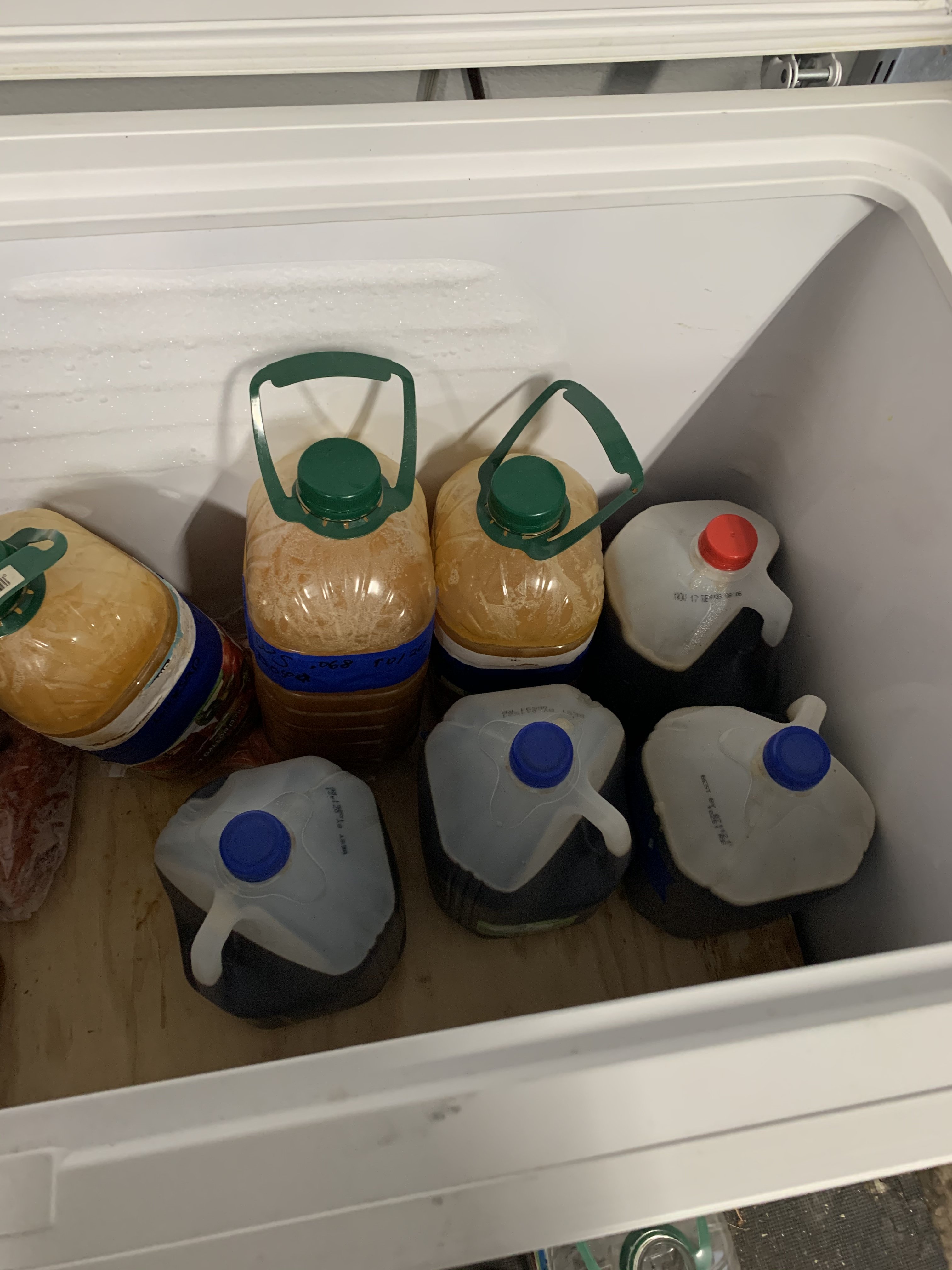I have froze extra wort from brew days before to turn into starters. It seemed the freezing process made the sugars condense some how and there would be places the wort would turn to a syrup almost like LME. I did them in freezer bags and the syrup would be stuck to the bag, freezing in a milk jug might be difficult to get out.
You are using an out of date browser. It may not display this or other websites correctly.
You should upgrade or use an alternative browser.
You should upgrade or use an alternative browser.
Freeze Your Wort
- Thread starter AzOr
- Start date

Help Support Homebrew Talk:
This site may earn a commission from merchant affiliate
links, including eBay, Amazon, and others.
bracconiere
Jolly Alcoholic - In Remembrance 2023
Yeah, it's all about temp vs pressure vs time.. I think 240 is the #(in F though). As pressure goes up, so does temp. All of this being said, botulism spores need to be present at canning/bottling to be a problem. I hate to sound like Van Morrison right now( I love his earlier stuff), but, if you seal it at boiling or near, and your sanitation is good, you are probably fine.Botulism will survive boiling temps. I only know this from canning stock, it has to be pressure processed instead of water bath. Not sure about ph or alcohols effect on it though.
Wow, breathylizer vs typing would have me not driving home now...
stay safe all...
It looks like I’ve really opened a can of worms here, I apologise. I can understand the trepidation, it is a newish process and it apparently sparked the same sort of controversy when it started over here.
I have contacted a local brew supplier who produces large quantities of the fresh wort kits, using the no chill method only to pasteurise - no UV treatment or further process required - and says they remain shelf stable for up to 12 months.
Below is a video link explaining for anyone who is interested.
I have contacted a local brew supplier who produces large quantities of the fresh wort kits, using the no chill method only to pasteurise - no UV treatment or further process required - and says they remain shelf stable for up to 12 months.
Below is a video link explaining for anyone who is interested.
Forgot to mention, the fresh wort kits are good. I’ve only tried them a few times before going to AG, but they were good. They didn’t save any time over the pre hopped extract kits that I was using, but they were definitely better quality, without that extracty taste.

$22.00 ($623.23 / Ounce)
AMZLMPKNTW Ball Lock Sample Faucet 30cm Reinforced Silicone Hose Secondary Fermentation Homebrew Kegging joyful
无为中南商贸有限公司

$58.16
HUIZHUGS Brewing Equipment Keg Ball Lock Faucet 30cm Reinforced Silicone Hose Secondary Fermentation Homebrew Kegging Brewing Equipment
xiangshuizhenzhanglingfengshop

$7.79 ($7.79 / Count)
Craft A Brew - LalBrew Voss™ - Kveik Ale Yeast - For Craft Lagers - Ingredients for Home Brewing - Beer Making Supplies - (1 Pack)
Craft a Brew

$176.97
1pc Commercial Keg Manifold 2" Tri Clamp,Ball Lock Tapping Head,Pressure Gauge/Adjustable PRV for Kegging,Fermentation Control
hanhanbaihuoxiaoshoudian

$53.24
1pc Hose Barb/MFL 1.5" Tri Clamp to Ball Lock Post Liquid Gas Homebrew Kegging Fermentation Parts Brewer Hardware SUS304(Gas MFL)
Guangshui Weilu You Trading Co., Ltd

$20.94
$29.99
The Brew Your Own Big Book of Clone Recipes: Featuring 300 Homebrew Recipes from Your Favorite Breweries
Amazon.com

$10.99 ($31.16 / Ounce)
Hornindal Kveik Yeast for Homebrewing - Mead, Cider, Wine, Beer - 10g Packet - Saccharomyces Cerevisiae - Sold by Shadowhive.com
Shadowhive

$33.95
Five Star - 6022b_ - Star San - 32 Ounce - High Foaming Sanitizer
Bridgeview Beer and Wine Supply

$33.99 ($17.00 / Count)
$41.99 ($21.00 / Count)
2 Pack 1 Gallon Large Fermentation Jars with 3 Airlocks and 2 SCREW Lids(100% Airtight Heavy Duty Lid w Silicone) - Wide Mouth Glass Jars w Scale Mark - Pickle Jars for Sauerkraut, Sourdough Starter
Qianfenie Direct

$53.24
1pc Hose Barb/MFL 1.5" Tri Clamp to Ball Lock Post Liquid Gas Homebrew Kegging Fermentation Parts Brewer Hardware SUS304(Liquid Hose Barb)
yunchengshiyanhuqucuichendianzishangwuyouxiangongsi

$39.22 ($39.22 / Count)
Brewer's Best Home Brew Beer Ingredient Kit - 5 Gallon (Mexican Cerveza)
Amazon.com
There's no alcohol in wort and before fermentation has happened PH hasn't dropped low enough either. On the other hand there are plenty of sugars so basically you're packaging a nutrient-rich culture medium hoping that all will go well. Oh well, it's all fun and games until someone comes down with a severe case of food poisoning...Botulism will survive boiling temps. I only know this from canning stock, it has to be pressure processed instead of water bath. Not sure about ph or alcohols effect on it though.
Mtrhdltd
Well-Known Member
- Joined
- Aug 16, 2020
- Messages
- 191
- Reaction score
- 137
Ha, good point. I guess I should remember the point of the thread before posting.There's no alcohol in wort and before fermentation has happened PH hasn't dropped low enough either. On the other hand there are plenty of sugars so basically you're packaging a nutrient-rich culture medium hoping that all will go well. Oh well, it's all fun and games until someone comes down with a severe case of food poisoning...
acrowe
Well-Known Member
- Joined
- Aug 30, 2013
- Messages
- 59
- Reaction score
- 73
Yes I can imagine there would be some risk of contamination sealing fresh wort and using it later, Lots of people home can their own salmon, I don't. I am guessing the commercial process must be pretty reliable as a lot of people use it. I would guess its not radically different than apple juice or less acid juices for risk though. I would have no fear of freezing wort I just made if I could be reasonably confident it didn't get contaminated a lot during the cool down to frozen.
Update-
I mashed a little over 7 gallons of a basic porter wort. I brewed half of it as a spiced porter and froze the rest of the wort.
The other half I may brew as is or maybe do a choc mint porter. Dunno yet but I have a long time to decide.
I love this method and am excited because I can experiment w hops, yeast etc.
Next will be a basic pilz wort. Half will be a straight forward pilz and the other half my be brewed as a hoppier pale lager. Maybe w a lot of whirlpool hops.
This method works for me because-
1) I currently have the freezer space.
2) I recently purchased a couple

 of 3g kegs
of 3g kegs
I can’t wait for my next brew day; I just have to thaw my wort and then proceed with the boil.
I mashed a little over 7 gallons of a basic porter wort. I brewed half of it as a spiced porter and froze the rest of the wort.
The other half I may brew as is or maybe do a choc mint porter. Dunno yet but I have a long time to decide.
I love this method and am excited because I can experiment w hops, yeast etc.
Next will be a basic pilz wort. Half will be a straight forward pilz and the other half my be brewed as a hoppier pale lager. Maybe w a lot of whirlpool hops.
This method works for me because-
1) I currently have the freezer space.
2) I recently purchased a couple


I can’t wait for my next brew day; I just have to thaw my wort and then proceed with the boil.
The other jugs in pic are pressed apple apple juice from this season.
Similar threads
- Replies
- 40
- Views
- 3K
- Replies
- 7
- Views
- 866
- Replies
- 3
- Views
- 475






![Craft A Brew - Safale BE-256 Yeast - Fermentis - Belgian Ale Dry Yeast - For Belgian & Strong Ales - Ingredients for Home Brewing - Beer Making Supplies - [3 Pack]](https://m.media-amazon.com/images/I/51bcKEwQmWL._SL500_.jpg)








































